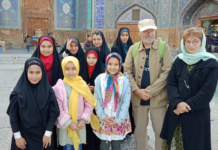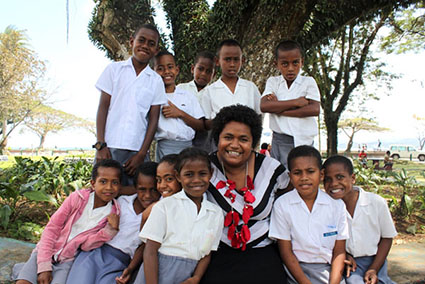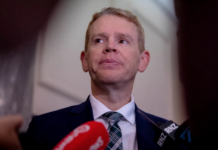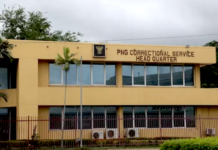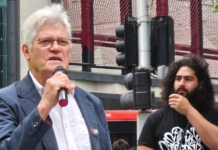Report by Pacific Media Centre
Teacher Mareani Sanegar left Rewa at 6am with her Year Three and Year Four students, taking a boat to attend the Literacy Day celebration in Suva. Image: KP Lew/PMC
Pacific Scoop: Report – By Kai Ping Lew in Suva
Education Minister Dr Mahendra Reddy says there is a “deficit culture” of thinking and reading in Fiji.
Speaking at the Literacy Day celebrations at Ratu Sukuna Park, Suva, today, he added that in order to have a knowledgeable society, Fiji needed to have a literate generation.
He appealed to parents to spend time with their children, encouraging them to read.
 Statistics from the 2012 Educational Quality and Assessment Programme survey showed that only three in 10 Pacific children had acceptable levels of literacy for their age, Dr Reddy said.
Statistics from the 2012 Educational Quality and Assessment Programme survey showed that only three in 10 Pacific children had acceptable levels of literacy for their age, Dr Reddy said.
Pacific Community director-general Colin Tukuitonga has also expressed concern, saying that improving literacy rates in the Pacific Islands is a priority for the development aspirations of the region to be realised.
Better opportunities
Read to Lead project chairperson Gazala Akbar said: “Not everyone has access to the same resources, especially in the rural and maritime areas. Read to Lead is trying to level the playing field and give everyone the same opportunities.”
The second phase of Vision Fiji’s Read to Lead project kicked off today. It will deliver 240 box library sets to primary schools in Fiji.
The Read to Lead project also includes a component monitoring and evaluating the literacy levels before and after receiving these books. The findings will be compiled into a report and shared with the Ministry of Education.
Having the same books in all schools will allow the report to gather more accurate information about the level of literacy in across the country.
“This is the first step building a more literate society,” said Akbar.
Inadequate libraries
Mereani Sanegar has been a teacher in Nukui Village School, one of the most rural schools in Rewa, for six years.
Her excited Year Three and Year Four students left Rewa with her at six in the morning, taking a boat to attend the Literacy Day celebration in Suva.
“We’re grateful for an opportunity like this because we really need those books,” she said.
“Currently in our library we only have very old books donated by schools overseas and the books prescribed in the syllabus. We use them.”
She added that one of the challenges in getting children to read was the second language barrier which discouraged her students, as they would rather do sports or watch television.
 “It’s a challenge, but it’s attainable,” said Sanegar.
“It’s a challenge, but it’s attainable,” said Sanegar.
Reading alternatives
Ana Ledua, mother of five, echoed the need for school libraries to be upgraded and told Republika magazine that she bought books for her children two or three times a year and.
However, she added that they were not the only way for children to gain literacy nowadays.
“They have access to technology and the media, so its much better now than it used to be before.
“If its introduced in schools and they have e-books, then that’s an effective way of getting it across to kids to read more.”
Niklas Pedersen and Kai Ping Lew are postgraduate student journalists from AUT University on the Asia-Pacific Journalism course. They are in Fiji on a two-week internship with Repúblika Magazine and Wansolwara and will also file a series of reports for Pacific Scoop about their experience.
—






